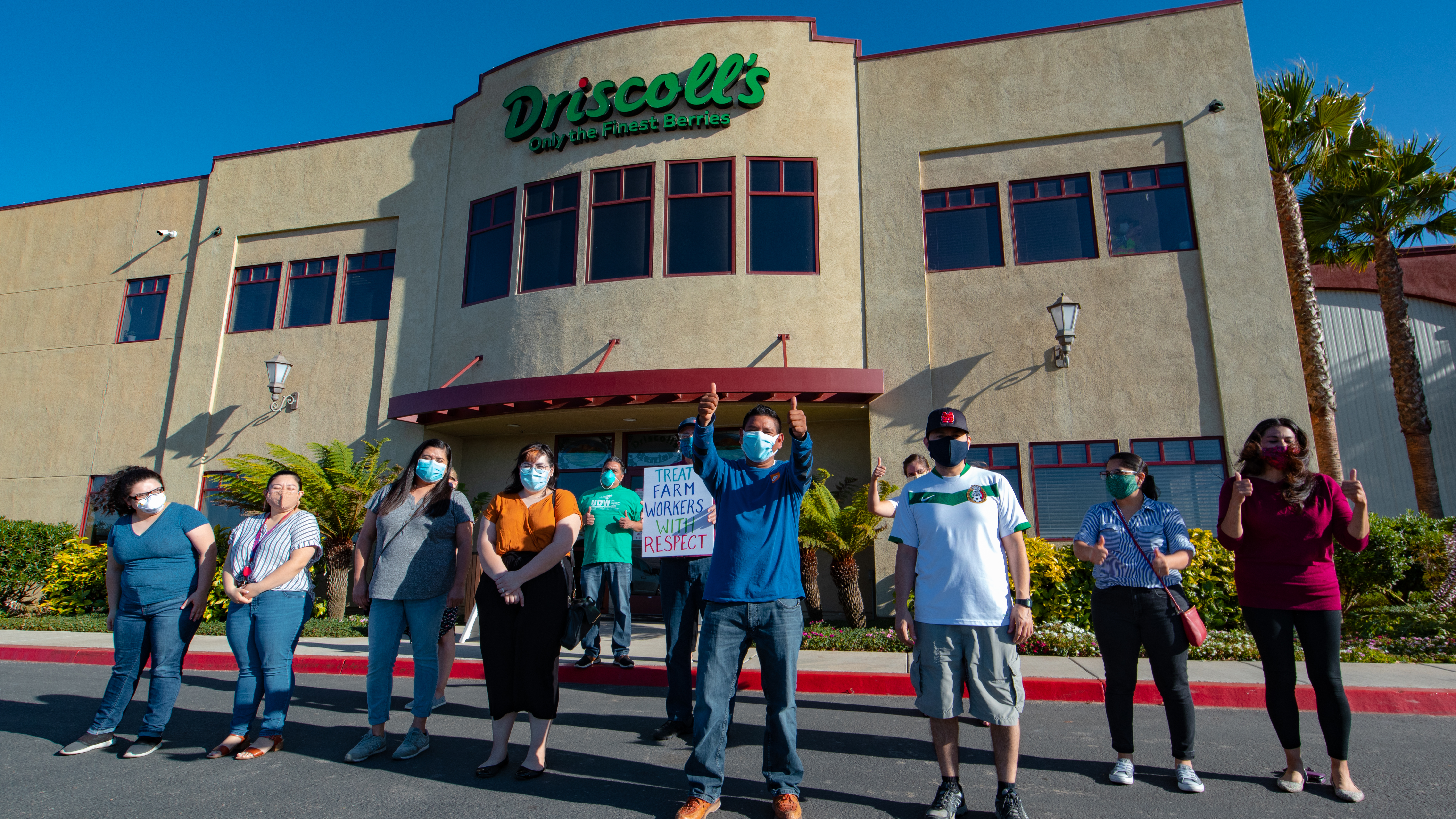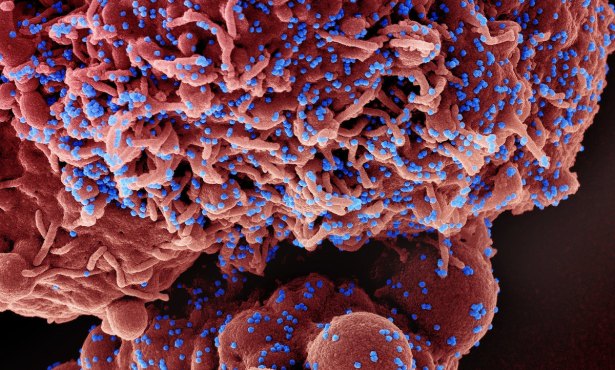Farmworkers in Santa Maria Win Better Wages, Working Conditions
Strawberry Pickers at Rancho Laguna Farms Celebrate Victory After Month-Long Labor Dispute

In Santa Maria, a labor dispute unfolded on the fields on Rancho Laguna Farms over the month of May and into June that drew attention to the intersection between the COVID-19 pandemic and issues in labor, poverty, and workers’ rights. Workers, upset by what they saw as a culture of neglect and expendability, organized for higher wages and safer working conditions, bringing them into conflict with the leadership at Rancho Laguna Farms in Santa Maria and Driscoll’s, the giant berry conglomerate for which Rancho Laguna is a regional supplier.
In a memo addressed to the workers of Rancho Laguna dated June 15, county planning commissioner and owner of Rancho Laguna Larry Ferini stated that an agreement had been reached that would affirm the right of employees to organize, provide additional infrastructure to enable more social distancing at work, and, most importantly, grant a raise of 20 cents per box of strawberries, boosting worker pay from $1.90 per box to $2.10. While Ferini praised the employees as “essential workers” and applauded their persistence in the face of difficult circumstances under COVID-19, workers and activists say they were treated dismissively by management during much of the course of the dispute.
Working in jobs that are physically grueling and economically precarious in the best of times, farmworkers say that the COVID-19 pandemic has magnified what they say is a culture of neglect and inadequate pay that led around 100 workers to participate in a work stoppage in early May. Activists involved in the dispute say that the response of management, at least at first, was one of disregard, even hostility.
Get the top stories in your inbox by signing up for our daily newsletter, Indy Today.
“When workers first submitted their grievances and participated in a work stoppage in May, their [management’s] response was to call law enforcement,” said Zulema Aleman, a community organizer with Central Coast Alliance United for a Sustainable Economy (CAUSE). “In normal times, the pay for this backbreaking work is already low, and now, with higher costs of things like child care because of the virus, it’s totally unsustainable.”
The dispute started on May 4, when workers organized a work stoppage in protest over what they said were inadequate wages and insufficient resources to protect workers from COVID-19. One employee, who spoke with the Independent in May on the condition of anonymity, said that when management called law enforcement in response to the work stoppage, several workers thought ICE had been called. “Lots of people, especially some of the women, were terrified,” said the employee.
On May 25, Rancho Laguna expressed willingness to raise worker pay from $1.90 to $2 per box of strawberries. Some workers were inclined to accept this as a win. They worried if they pressed their luck, they might end up with nothing at all, nullifying their efforts and the risks they took when they decided to organize.
But others, citing the rising prices of things like child care and groceries due to COVID-19, wanted to push for $2.15 a box. “The 10-cent raise is not enough,” said the farmworker in May. “Even when we have a good season, we barely make enough to cover expenses. There is never enough left over for savings. There are 65-year-old men still out picking in the fields because they can’t afford to stop. I can’t afford to stop.”
While wages and working conditions may have been the primary point of contention in the dispute, just as present was indignation over the feeling among workers that they were seen as expendable: essential enough to perform backbreaking labor while wearing masks in the stifling heat, but not essential enough to deserve livable wages or benefits. “They don’t care about us. They don’t communicate with us. They don’t support us. They just want us to keep working,” said the farmworker in May. “They know that a lot of us can’t afford to stop working, so they don’t listen to us.”
On May 28, workers and activists submitted a petition to Driscoll’s with the signatures of 75 workers, calling for better wages and working conditions. According to a press release from CAUSE, Driscoll’s staff “refused to receive them and instead called the police to have workers removed from the property,” which they called a “blatant act of intimidation.” It was then, according to the press release, that the workers and activists decided to “engage a broader audience,” and launched a petition calling on Driscoll’s to encourage Rancho Laguna to implement the desired changes. The petition picked up national attention and collected more than 57,000 signatures in just under two weeks, and was presented to Driscoll’s on June 9.
Driscoll’s does not have direct influence over the labor policies and wages offered by Rancho Laguna, a point they emphasized in their response to questions from the Independent, saying their involvement would “interfere with the operations of the separate and independent business of Rancho Laguna Farms.” Driscoll’s also stated that their labor standards “require the right to collective action be respected without interference or reprisal” and that the dispute taking place at Rancho Laguna was over wage levels, not violations of California wage law.
While Rancho Laguna owner Larry Ferini did not respond to inquiries from the Independent, a statement from Ferini at the time of the June 9 petition submission stated that the decision to call the sheriff when workers initially walked off the job was “seen as a misstep and caused an erosion of trust by the employees.” The statement from Ferini also noted that Rancho Laguna would be taking further steps to make social distancing easier in the fields and provide management with training in conflict resolution.
An agreement between Rancho Laguna was officially reached on June 11, affirming the right of workers to organize without fear of retaliation, a raise of 20 cents per box of strawberries, and a tripling of the amount of shade provided by the farm to enable more effective social distancing, according to Hazel Davalos, a spokesperson for CAUSE.
Asked what tipped the balance in the dispute, CAUSE organizer Zulema Aleman said that the online petition seemed to bring attention and urgency to the demands and put pressure on the farm and Driscoll’s and “brought in the public as someone who could hold the companies accountable if they weren’t capable of holding themselves accountable.”
However, she added that the victory started and ended with the workers. “Everything is founded on the organizing the workers did at the beginning.”
At the Santa Barbara Independent, our staff is working around the clock to cover every aspect of this crisis — sorting truth from rumor. Our reporters and editors are asking the tough questions of our public health officials and spreading the word about how we can all help one another. The community needs us — now more than ever — and we need you in order to keep doing the important work we do. Support the Independent by making a direct contribution or with a subscription to Indy+.


